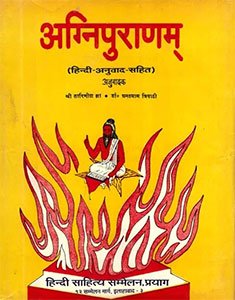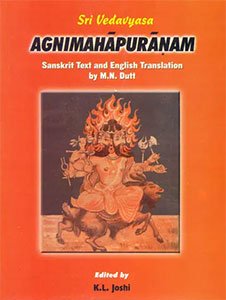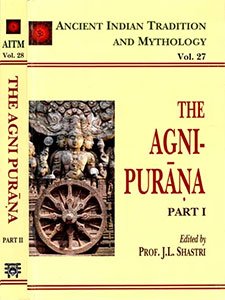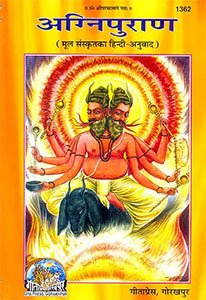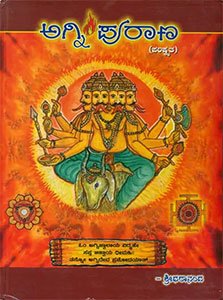Agni Purana [sanskrit]
97,288 words
This Sanskrit edition of the Agnipurana. It is one of the traditional eighteen Mahapuranas presented as an encyclopedia of ancient Indian history and knowledge. It contains either 382 or 383 chapters and over 10.000 verses (Sanskrit Shlokas).
Verse 133.41
ओं वातले वितले विडालमुखि इन्द्रपुत्रि उद्भवो वायुदेवेन खीलि आजी हाजा मयि वाह इहादि दुःखनित्यकण्ठोच्चैर्मुहूर्तान्वया अह मां यस्महं उपाडि ओं भेलखि ओं स्वाहा ।
नवदुर्गासप्तजप्तान्मुखस्तम्भो मुखस्थितात् ।
ओं चण्डि ओं हूं फट्स्वाहा ।
गृहीत्वा सप्तजप्तं तु खद्गयुद्धेऽपराजितः ॥ ४१ ॥
oṃ vātale vitale viḍālamukhi indraputri udbhavo vāyudevena khīli ājī hājā mayi vāha ihādi duḥkhanityakaṇṭhoccairmuhūrtānvayā aha māṃ yasmahaṃ upāḍi oṃ bhelakhi oṃ svāhā |
navadurgāsaptajaptānmukhastambho mukhasthitāt |
oṃ caṇḍi oṃ hūṃ phaṭsvāhā |
gṛhītvā saptajaptaṃ tu khadgayuddhe'parājitaḥ || 41 ||
The Sanskrit text of Verse 133.41 is contained in the book The Agni Puranam (Anandashram Edition) by Shri Chimna Apate (श्री चिमणा आपटे). This book is available online or you could buy the latest edition:
Read online Buy now! The Sanskrit text by Shri Chimna Apate (श्री चिमणा आपटे) (1987)
Glossary of Sanskrit terms
Note: This extracts Sanskrit terms and links to English definitions from the glossary, based on an experimental segmentation of verse (133.41). Some terms could be superfluous while some might not be mentioned. Click on the word to show English definitions.
Vatala, Vitala, Vidala, Uksh, Indra, Putri, Putrin, Udbhava, Vayudeva, Aji, Han, Aja, Mayi, Asmad, Vaha, Vahas, Iha, Duhkha, Nitya, Kantha, Uccaih, Ucca, Muhurta, Vaya, Aha, Asma, Ham, Upa, Adi, Svaha, Navadurga, Saptajapta, Mukha, Bha, Mukhasthita, Candi, Candin, Hum, Phat, Grihitva, Khadga, Yuddha, Aparajita,
Analysis of Sanskrit grammar
Note: this is an experimental feature and only shows the first possible analysis of the Sanskrit text (Verse 133.41). If the system was successful in segmenting the sentence, you will see of which words it is made up of, generally consisting of Nouns, Pronouns, Verbs, Participles and Indeclinables. Click on the link to show all possible derivations of the word.
- Line 1: “oṃ vātale vitale viḍālamukhi indraputri udbhavo vāyudevena khīli ājī hājā mayi vāha ihādi duḥkhanityakaṇṭhoccairmuhūrtānvayā aha māṃ yasmahaṃ upāḍi oṃ bhelakhi oṃ svāhā ”
- Cannot analyse om*vā
- vātale -
-
vātala (noun, masculine)[locative single]vātala (noun, neuter)[nominative dual], [vocative dual], [accusative dual], [locative single]vātalā (noun, feminine)[nominative dual], [vocative single], [vocative dual], [accusative dual]
- vitale -
-
vitala (noun, neuter)[nominative dual], [vocative dual], [accusative dual], [locative single]
- viḍālam -
-
viḍāla (noun, masculine)[adverb], [accusative single]viḍāla (noun, neuter)[adverb], [nominative single], [accusative single]
- uk -
-
ukṣ (noun, masculine)[compound], [adverb], [nominative single], [vocative single]ukṣ (noun, neuter)[compound], [adverb], [nominative single], [vocative single], [accusative single]
- hi -
-
hi (indeclinable particle)[indeclinable particle]
- indra -
-
indra (noun, masculine)[compound], [vocative single]
- putri -
-
putrī (noun, feminine)[adverb], [vocative single]putrin (noun, masculine)[compound], [adverb]putrin (noun, neuter)[compound], [adverb], [nominative single], [vocative single], [accusative single]
- udbhavo* -
-
udbhava (noun, masculine)[nominative single]
- vāyudevena -
-
vāyudeva (noun, neuter)[instrumental single]
- Cannot analyse khīli*āj
- ājī -
-
āji (noun, masculine)[nominative dual], [vocative dual], [accusative dual]
- hā -
-
ha (noun, masculine)[compound], [vocative single]ha (noun, neuter)[compound], [vocative single]han (noun, neuter)[compound], [adverb], [nominative single], [vocative single], [accusative single]hā (noun, feminine)[nominative single]han (noun, masculine)[nominative single]√hā (verb class 1)[imperative active second single]
- ajā* -
-
ajā (noun, feminine)[nominative plural], [vocative plural], [accusative plural]aja (noun, masculine)[nominative plural], [vocative plural]
- mayi -
-
mayī (noun, feminine)[adverb], [vocative single]asmad (pronoun, none)[locative single]
- vāha* -
-
vāhas (noun, masculine)[compound], [vocative single]vāhas (noun, neuter)[compound], [nominative single], [vocative single], [accusative single]vāha (noun, masculine)[nominative single]
- ihā -
-
iha (indeclinable adverb)[indeclinable adverb]iha (indeclinable)[indeclinable]
- adi -
-
ad (noun, masculine)[locative single]ad (noun, neuter)[locative single]
- duḥkha -
-
duḥkha (noun, masculine)[compound], [vocative single]duḥkha (noun, neuter)[compound], [vocative single]
- nitya -
-
nitya (indeclinable adverb)[indeclinable adverb]nitya (noun, masculine)[compound], [vocative single]nitya (noun, neuter)[compound], [vocative single]
- kaṇṭho -
-
kaṇṭha (noun, masculine)[compound], [vocative single]√kaṇṭh (verb class 1)[imperative active second single]
- uccair -
-
uccaiḥ (indeclinable)[indeclinable]uccaiḥ (indeclinable adverb)[indeclinable adverb]ucca (noun, masculine)[instrumental plural]ucca (noun, neuter)[instrumental plural]
- muhūrtān -
-
muhūrta (noun, masculine)[accusative plural]
- vayā* -
-
vaya (noun, masculine)[nominative plural], [vocative plural]vayā (noun, feminine)[nominative plural], [vocative plural], [accusative plural]
- aha -
-
aha (noun, neuter)[compound], [vocative single]
- mām -
-
mā (noun, feminine)[accusative single]asmad (pronoun, none)[accusative single]
- ya -
-
i (noun, masculine)[compound], [adverb], [nominative dual], [vocative dual], [accusative dual]ī (noun, feminine)[compound], [adverb]ī (noun, masculine)[compound], [adverb]e (noun, masculine)[adverb]
- asma -
-
asma (noun, masculine)[compound], [vocative single]asma (noun, neuter)[compound], [vocative single]
- ham -
-
ham (indeclinable)[indeclinable]ha (noun, masculine)[adverb], [accusative single]ha (noun, neuter)[adverb], [nominative single], [accusative single]hā (noun, feminine)[adverb]han (noun, neuter)[adverb]
- upā -
-
upā (indeclinable)[indeclinable]upa (indeclinable adverb)[indeclinable adverb]upa (indeclinable preposition)[indeclinable preposition]upa (indeclinable)[indeclinable]
- āḍi -
-
āḍi (noun, feminine)[compound], [adverb]āḍī (noun, feminine)[adverb], [vocative single]
- Cannot analyse om*bh
- Cannot analyse bhelakhi*oṃ
- Cannot analyse om*sv
- svāhā -
-
svāhā (indeclinable)[indeclinable]svāhā (noun, feminine)[nominative single]
- Line 2: “navadurgāsaptajaptānmukhastambho mukhasthitāt ”
- navadurgā -
-
navadurgā (noun, feminine)[nominative single]
- saptajaptān -
-
saptajapta (noun, masculine)[adverb], [accusative plural], [ablative single]saptajapta (noun, neuter)[adverb], [ablative single]
- mukhas -
-
mukha (noun, masculine)[nominative single]
- tam -
-
ta (noun, masculine)[adverb], [accusative single]ta (noun, neuter)[adverb], [nominative single], [accusative single]tā (noun, feminine)[adverb]tan (noun, masculine)[adverb]sa (noun, masculine)[accusative single]
- bho* -
-
bha (noun, masculine)[nominative single]bhā (noun, masculine)[accusative plural], [ablative single], [genitive single]
- mukhasthitāt -
-
mukhasthita (noun, masculine)[adverb], [ablative single]mukhasthita (noun, neuter)[adverb], [ablative single]
- Line 3: “oṃ caṇḍi oṃ hūṃ phaṭsvāhā ”
- Cannot analyse om*ca
- caṇḍi -
-
caṇḍi (noun, feminine)[compound], [adverb]caṇḍī (noun, feminine)[adverb], [vocative single]caṇḍin (noun, masculine)[compound], [adverb]caṇḍin (noun, neuter)[compound], [adverb], [nominative single], [accusative single]caṇḍī (noun, masculine)[adverb]caṇḍī (noun, neuter)[compound], [adverb], [nominative single], [vocative single], [accusative single]
- Cannot analyse om*hū
- hūm -
-
hūm (indeclinable)[indeclinable]
- phaṭ -
-
phaṭ (indeclinable)[indeclinable]
- svāhā -
-
svāhā (indeclinable)[indeclinable]svāhā (noun, feminine)[nominative single]
- Line 4: “gṛhītvā saptajaptaṃ tu khadgayuddhe'parājitaḥ ”
- gṛhītvā -
-
gṛhītvā (indeclinable)[indeclinable]√grah -> gṛhītvā (absolutive)[absolutive from √grah]
- saptajaptam -
-
saptajapta (noun, masculine)[adverb], [accusative single]saptajapta (noun, neuter)[adverb], [nominative single], [accusative single]
- tu -
-
tu (indeclinable particle)[indeclinable particle]
- khadga -
-
khadga (noun, masculine)[compound], [vocative single]khadga (noun, neuter)[compound], [vocative single]
- yuddhe' -
-
yuddha (noun, masculine)[locative single]yuddha (noun, neuter)[nominative dual], [vocative dual], [accusative dual], [locative single]yuddhā (noun, feminine)[nominative dual], [vocative single], [vocative dual], [accusative dual]√yudh -> yuddha (participle, masculine)[locative single from √yudh class 1 verb], [locative single from √yudh class 4 verb]√yudh -> yuddha (participle, neuter)[nominative dual from √yudh class 1 verb], [vocative dual from √yudh class 1 verb], [accusative dual from √yudh class 1 verb], [locative single from √yudh class 1 verb], [nominative dual from √yudh class 4 verb], [vocative dual from √yudh class 4 verb], [accusative dual from √yudh class 4 verb], [locative single from √yudh class 4 verb]√yudh -> yuddhā (participle, feminine)[nominative dual from √yudh class 1 verb], [vocative single from √yudh class 1 verb], [vocative dual from √yudh class 1 verb], [accusative dual from √yudh class 1 verb], [nominative dual from √yudh class 4 verb], [vocative single from √yudh class 4 verb], [vocative dual from √yudh class 4 verb], [accusative dual from √yudh class 4 verb]
- aparājitaḥ -
-
aparājita (noun, masculine)[nominative single]
Other editions:
Also see the following editions of the Sanskrit text or (alternative) English translations of the Verse 133.41
Agni Purana with Hindi Translation
by Tarinish Jha and Dr. Ghanshayam Tripathi (तारिणीश् झा और डॉ. घनश्याम त्रिपाठी) (2007)
Publisher: Hindi Sahitya Sammelan, Allahabad; 1199 pages; Title: अग्निपुराणम् (संस्कृत एवं हिन्दी अनुवाद);
Buy now!
Agni Purana (Two Volumes)
by M. N. Dutt (2023)
Publisher: Parimal Publication Pvt. Ltd.; Editor: K. L. Joshi.; ISBN-10: 8171101690; ISBN-13: 9788171101696; 1070 pages.
Buy now!
Agni-Purana (Set of 4 Volumes)
by N. Gangadharan (2006)
Publisher: Motilal Banarsidass Publishers Pvt. Ltd.; ISBN: Part I 8120803590 (9788120803596); Part II 8120803604 (9788120803602); Part III 8120801741 (9788120801745); Part IV 812080306X (9788120803060); 1271 pages.
Buy now!
The Agni Purana (Hindi)
by (2013)
Publisher: Gita Press, Gorakhpur; Title: अग्निपुराण (केवल हिन्दी अनुवाद); ISBN-10: 8129302934; ISBN-13: 9788129302939; 848 pages.
Buy now!
Agni Purana (Kannada)
by Sreedharananda (2013)
Publisher: Pooja Pusthaka Bhandara, Bangalore; Title: ಅಗ್ನಿ ಪುರಾಣ; 560 pages.
Buy now!Preview of verse 133.41 in Kannada sript:
ಓಂ ವಾತಲೇ ವಿತಲೇ ವಿಡಾಲಮುಖಿ ಇನ್ದ್ರಪುತ್ರಿ ಉದ್ಭವೋ ವಾಯುದೇವೇನ ಖೀಲಿ ಆಜೀ ಹಾಜಾ ಮಯಿ ವಾಹ ಇಹಾದಿ ದುಃಖನಿತ್ಯಕಣ್ಠೋಚ್ಚೈರ್ಮುಹೂರ್ತಾನ್ವಯಾ ಅಹ ಮಾಂ ಯಸ್ಮಹಂ ಉಪಾಡಿ ಓಂ ಭೇಲಖಿ ಓಂ ಸ್ವಾಹಾ ।
ನವದುರ್ಗಾಸಪ್ತಜಪ್ತಾನ್ಮುಖಸ್ತಮ್ಭೋ ಮುಖಸ್ಥಿತಾತ್ ।
ಓಂ ಚಣ್ಡಿ ಓಂ ಹೂಂ ಫಟ್ಸ್ವಾಹಾ ।
ಗೃಹೀತ್ವಾ ಸಪ್ತಜಪ್ತಂ ತು ಖದ್ಗಯುದ್ಧೇಽಪರಾಜಿತಃ ॥ ೪೧ ॥
![Agni Purana [sanskrit] - book cover](/uploads/a/Agni-Purana-Sanskrit.jpg)
